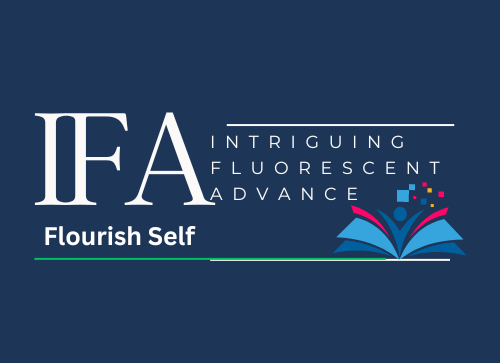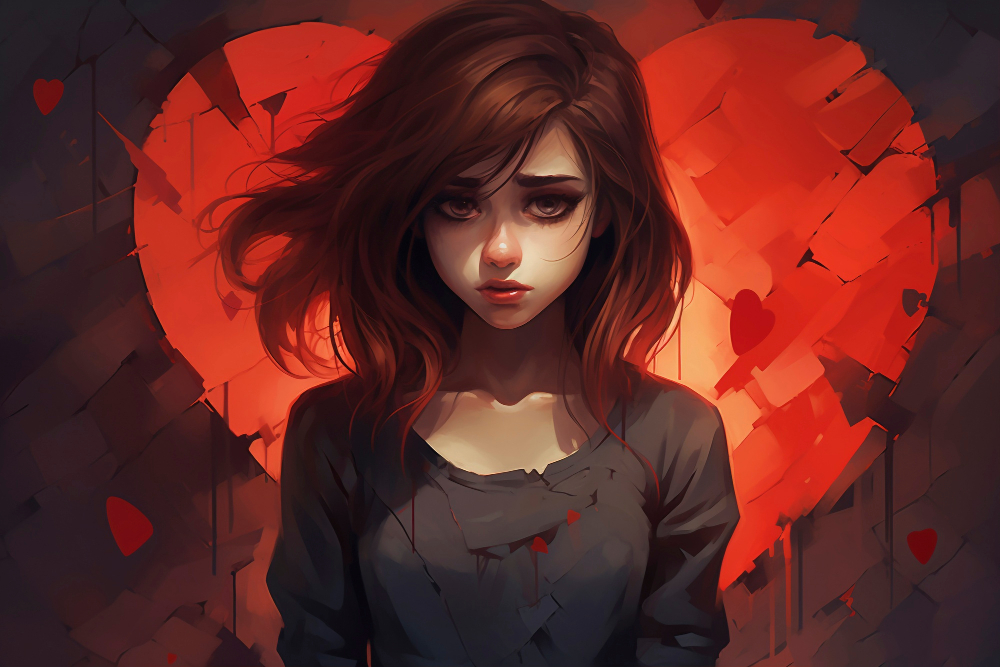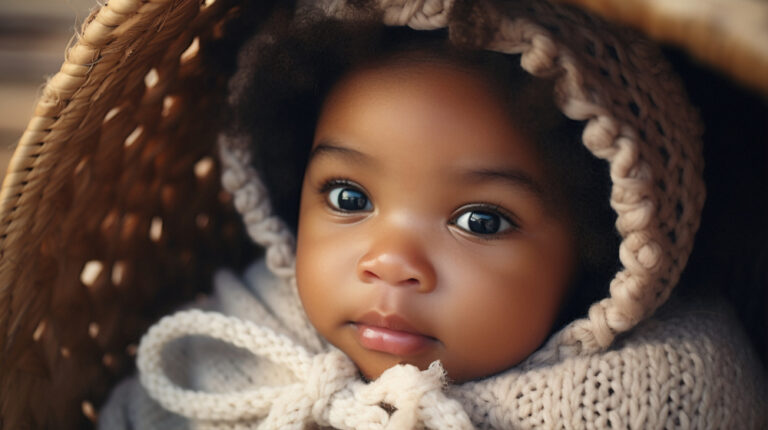
Unique Female Demon Names for Your Baby
In the world of names, there’s a unique corner filled with unique female demon names. These names come with stories from myths and legends. They give a sense of strength and mystery. When you choose a female demon name for your baby, you’re picking something beyond the usual. These names are more than just tags. They are a mark of power and individuality.
Giving your child a demonic female name adds a bold and unique touch. It’s a nod to a rich heritage and femininity’s mysterious sides. For those looking for special names, dive into different cultures. You’ll find names that are deep and enchanting, leaving a lasting impression on anyone who hears them.
Key Takeaways
- Female demon names offer a unique and compelling choice for baby names.
- These names carry the weight and wisdom of myths and legends, providing a sense of depth.
- Demonic female names are emblematic of strength and individuality.
- Choosing such a name can celebrate a legacy of feminine power.
- They offer an alternative to traditional names, appealing to creativity and distinctness.
- Each name holds a story, rich with cultural significance and ancestral honor.
Intriguing Origins: Female Demon and Goddess Names
The myths of history weave with the beauty of female demon names baby and majestic demon goddess names. These names hold ancient stories of power and mystery. They mix different cultures’ myths, making their origins inspire us today.
Names like Hecate show women’s power in myths. She’s linked to magic and important choices. Powerful female demon names are more than just interesting. They tell important stories, making them symbols of strength.
- Hecate – Greek goddess of magic, crossroads, and ghosts.
- Lilith – Ancient Hebrew figure associated with the night and freedom.
- Astarte – Phoenician goddess of war and love, embodying strength and passion.
- Abyzou – Figure from Greek and Near Eastern mythology, linked with childbirth and misfortune.
- Tiamat – Babylonian goddess of the ocean and chaos, a symbol of creation and destruction.
- Morrigan – Celtic goddess of war, fate, and death, embodying the cycle of life and transformation.
- Kali – Hindu goddess of time, doomsday, and death, yet also a symbol of motherly love.
- Hel – Norse goddess of the dead and the underworld, representing the finality and inevitability of death.
- Ishtar – Mesopotamian goddess of love and war, showcasing dualities of human emotion.
- Persephone – Greek goddess of the underworld and spring growth, a tale of abduction and return.
- Sekhmet – Egyptian warrior goddess and goddess of healing, symbolizing the fierce power of the sun.
- Lamia – Greek mythological figure, a queen turned into a child-eating demon.
- Freya – Norse goddess of love, beauty, fertility, and fate, a figure of prophecy and fortune.
- Hera – Queen of the Greek gods, representing marriage and the life of women.
- Morgan le Fay – A powerful enchantress in Arthurian legend, linked with magic and mystique.
- Circe – Greek sorceress who transformed her enemies into animals, a symbol of cunning and transformation.
- Ereshkigal – Sumerian goddess of the underworld, ruling over the dead.
- Hathor – Egyptian goddess of the sky, dance, love, beauty, and joy, fostering life and music.
- Nyx – Greek primordial goddess of the night, enveloping the world in darkness.
- Bastet – Egyptian goddess of home, fertility, and cats, protecting households and ensuring fertility.
- Inanna – Sumerian goddess of love, beauty, sex, war, justice, and political power.
- Artemis – Greek goddess of the hunt, wilderness, and animals, a protector of women.
- Bellona – Roman goddess of war, companion of Mars, representing the fury and tumult of battle.
- Medusa – Greek mythological figure, whose gaze could turn people to stone, often misunderstood symbol of protection.
- Ixchel – Maya goddess of childbirth and war, a patron of women’s crafts.
- Skadi – Norse goddess of winter, skiing, and mountains, a figure of survival and strength.
- Durga – Hindu warrior goddess, a protector against evil with her divine powers.
- Pele – Hawaiian goddess of volcanoes and fire, creator of the Hawaiian Islands.
- Angrboda – Norse giantess and mother of some of Loki’s children, a herald of sorrow.
- Macha – One of the Morrigan sisters in Celtic mythology, associated with war and sovereignty.
Choosing one of these names for a baby is special. It links the child to past goddesses’ unbreakable spirits. These names come with stories of divine women’s power and magical skills.
- Hecate’s followers show skill in magic, reflecting the balance of care and authority.
- Lilith’s story is one of change and freedom, challenging social norms.
- Astarte’s name speaks of bravery and strong love, showing the warrior and lover in her.
These names stand as icons of feminist heritage. They remain powerful in ancient rituals and historical records, inspiring with their deep meanings.
Naming with these is bold. It shows one’s values and explores identity’s mythic sides. Giving a child one of these names passes on a legacy. It celebrates the divine feminine’s lasting power.
Female Demon Names Baby: A Touch of Mystery and Power
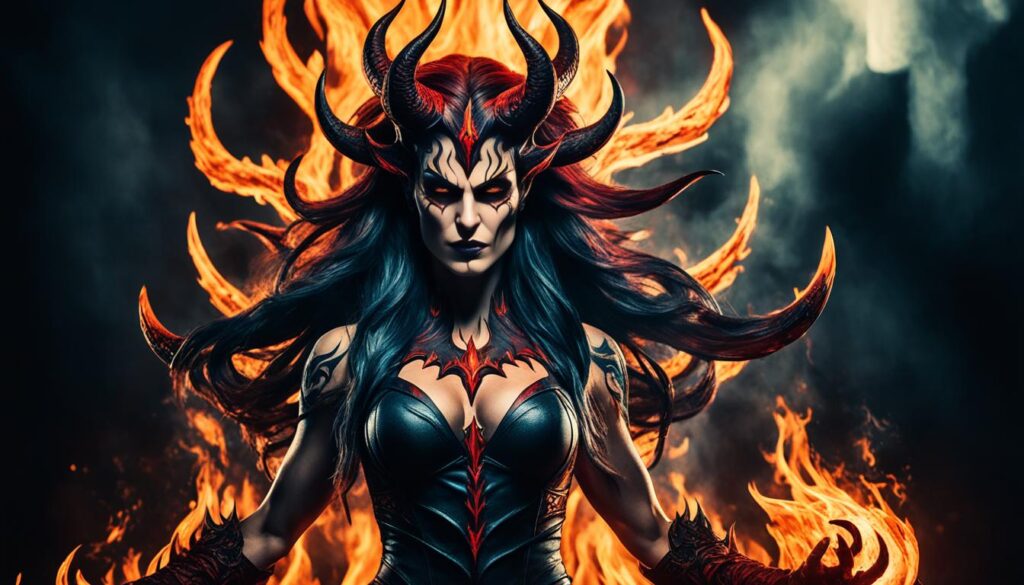
Exploring female demon names baby offers a chance to give your child a unique and powerful name. This choice connects your little one to the realm of strong female spirits. These beings captivate us with their mystery and strength.
Why Choose a Female Demon Name for Your Baby?
Names like Lamia or Lilith are not just beautiful. They bring to life tales of wisdom and defiance. They symbolize independence and non-conformity. Perfect for parents seeking supernatural baby girl names that honor legendary women.
Dark and Fierce Baby Girl Names From Around the World
- Gaia – Greek goddess of the Earth, representing motherhood and the nurturing force of nature.
- Venus – Roman goddess of love and beauty, a symbol of attraction and femininity.
- Minerva – Roman goddess of wisdom and strategic warfare, epitomizing intelligence and skill.
- Brigid – Celtic goddess of fire, poetry, and healing, reflecting creativity and knowledge.
- Demeter – Greek goddess of agriculture and harvest, symbolizing fertility and nurturing.
- Isis – Egyptian goddess of magic and motherhood, embodying the ideal mother and wife.
- Juno – Roman queen of the gods, protector of women and the state, a figure of authority and loyalty.
- Aphrodite – Greek goddess of love and beauty, representing passion and desire.
- Ostara – Germanic goddess of spring and dawn, bringing renewal and rejuvenation.
- Freya – Norse goddess of love, beauty, and fertility, also associated with war and death.
- Danu – Celtic mother goddess, associated with the land and rivers, symbolizing abundance.
- Selene – Greek goddess of the moon, representing the celestial and the subconscious.
- Artemis – Greek goddess of the hunt and wilderness, protector of young girls, symbolizing independence and purity.
- Diana – Roman goddess of the hunt and moon, embodying strength and the protector of the wild.
- Cerridwen – Welsh goddess of magic, transformation, and knowledge, associated with the cauldron of poetic inspiration.
- Saraswati – Hindu goddess of knowledge, music, art, and wisdom, a symbol of creative energy.
- Yemaya – Yoruba goddess of the sea and motherhood, protector of children and the bereaved.
- Rhea – Greek Titaness, mother of the gods, associated with fertility and the flow of time.
- Anat – Ancient Semitic goddess of war and fertility, showing the dual aspects of protection and nurturing.
- Eos – Greek goddess of the dawn, bringing light and hope each day.
- Hera – Greek goddess of marriage and family, representing commitment and queenly aspects.
- Maat – Egyptian goddess of truth, justice, and cosmic order, symbolizing the moral and ethical principles of life.
- Nehalennia – A goddess from Dutch and Celtic mythology, protector of seafarers and traders.
- Pachamama – Inca goddess of earth and fertility, a nurturing figure ensuring nourishment and protection.
- Sif – Norse goddess associated with earth, known for her golden hair, symbolizing fertility and family.
- Tara – Hindu and Buddhist goddess, a figure of compassion and liberation.
- Valkyrie – From Norse mythology, choosers of the slain, linking to themes of destiny and heroism.
- Wadjet – Egyptian goddess of protection and justice, often depicted as a cobra, guarding the pharaoh.
- Xochiquetzal – Aztec goddess of fertility, beauty, and female sexual power, representing empowerment and crafts.
- Zenobia – Historical queen of Palmyra, embodying strength, intelligence, and independence.
Choosing a demonic female name dives into a tradition of empowering stories. It’s a way to connect with fascinating tales that inspire.
Popular Culture Inspiration: Empowerment in Evil Queen and Demoness Names
Modern stories have given villains like Bellatrix complex roles. These evil queen names for girls encourage toughness and independence. They show that these characters possess admirable qualities, like intelligence and resilience.
Names from literature and movies can shape a child’s journey. They mirror the power and intellect of iconic characters. A girl with such a name carries a legacy of strength. She proudly embodies an identity linked to devilish baby girl names.
- Bellatrix – From “Harry Potter,” a name signifying a strong, albeit dark, warrior.
- Maleficent – From “Sleeping Beauty,” representing power and transformation.
- Morgana – From Arthurian legend, a powerful sorceress with complex motives.
- Lamia – Greek mythology, a demoness who became a child-eating monster.
- Ursula – From “The Little Mermaid,” a cunning and resourceful sea witch.
- Cruella – From “101 Dalmatians,” epitomizing fierce ambition and bold style.
- Jezebel – Biblical queen known for her assertive defiance and royal authority.
- Hela – From Norse mythology and “Thor” in Marvel, goddess of death.
- Ravenna – From “Snow White and the Huntsman,” a figure of dark beauty and power.
- Nimue – Also known as the Lady of the Lake in Arthurian legends, a powerful enchantress.
- Medea – From Greek mythology, a sorceress known for her vengeance and magical prowess.
- Selene – From “Underworld,” a vampire warrior queen of strength and agility.
- Azula – From “Avatar: The Last Airbender,” a skilled strategist and a firebending prodigy.
- Regina – From “Once Upon a Time,” a complex character who evolves from evil queen to hero.
- Livia – From Roman history and literature, often portrayed with cunning and ambition.
- Mystique – From “X-Men,” known for her shape-shifting abilities and strategic mind.
- Cersei – From “Game of Thrones,” a queen known for her ruthless tactics and survival skills.
- Lilith – Mythological figure associated with the night and seen as a symbol of freedom.
- Elektra – From Greek mythology and Marvel Comics, a formidable warrior.
- Kali – Hindu goddess associated with empowerment and destruction.
- Grindelwald – Feminine twist on the name from “Harry Potter,” signifying dark power.
- Ivy – From “Batman,” a villain who is both intelligent and eco-centric.
- Vesper – From James Bond, a complex and mysterious character.
- Eris – Goddess of discord from Greek mythology, representing chaos and strife.
- Morrigan – From Celtic mythology, a goddess of war and fate with a formidable presence.
- Sauri – A feminine twist on Sauron from “Lord of the Rings,” embodying ultimate power.
- Xenia – From “GoldenEye,” a fierce and memorable antagonist.
- Domino – From Marvel, known for her luck and precise combat skills.
- Harley – From “Harley Quinn,” symbolizing anarchic energy and resilience.
- Mab – Queen Mab from various mythologies and literature, known for her fairy queen status and mischievous deeds.
Elegant Yet Wicked: Supernatural Baby Girl Names
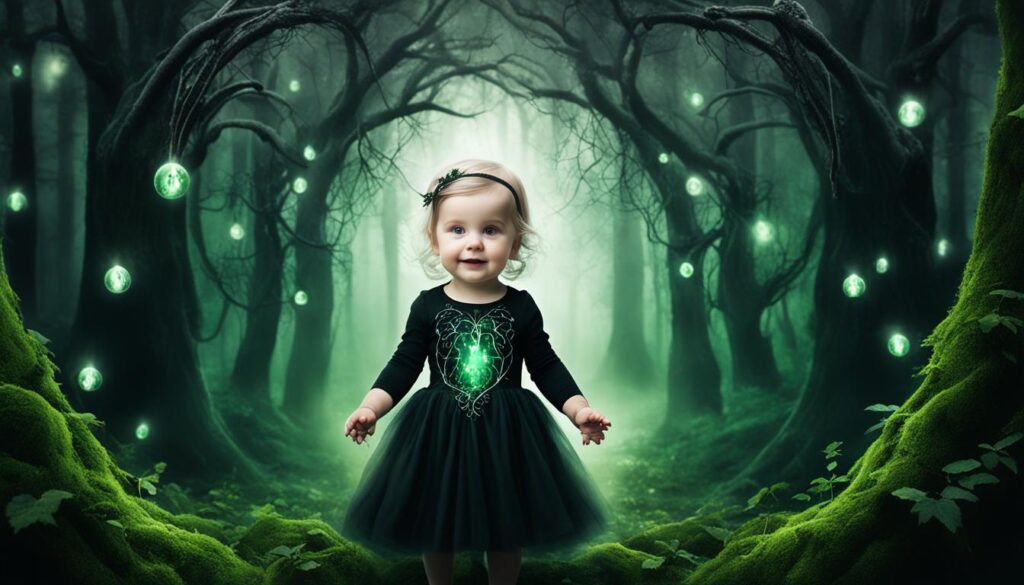
Some parents look for names with deep, dark stories for their baby. Supernatural baby girl names stand out, mixing mystery with grace. These names carry a sense of magic, reminding us of deities and mythical queens from long ago.
Dark goddess names, like Selene and Persephone, add a unique beauty to a girl’s name. These goddesses symbolize power and change, making the names special. They bring a sense of mystery and respect to those who have them.
Evil queen names for girls evoke images of powerful rulers. Names such as Morgana and Ravenna suggest both authority and secret stories. They tell a tale of strength and hidden magic.
- Nyx – Greek goddess of the night, representing the profound power of darkness.
- Hecate – Associated with magic, witchcraft, and the night, a deity of crossroads.
- Lilith – A figure symbolizing independence and the dark strength of the night.
- Morgana – From Arthurian legend, known for her sorcery and complex narrative.
- Ravenna – A queen from “Snow White and the Huntsman,” known for her dark magic and beauty.
- Persephone – Queen of the underworld, embodying the change of seasons and a dual life.
- Selene – The moon goddess in Greek mythology, symbolizing mystery and the celestial.
- Morrigan – Celtic goddess of war and fate, often associated with prophetic powers.
- Circe – A sorceress from Greek mythology who used her powers to transform her enemies.
- Freya – Norse goddess of love, beauty, and fertility, also associated with war and death.
- Kali – A Hindu goddess known for her destructive power as well as her maternal affection.
- Ishtar – Ancient Mesopotamian goddess of love and war, embodying dual extremes.
- Banshee – From Irish mythology, a spirit whose wail is said to foretell death.
- Melisandre – From “Game of Thrones,” known for her prophetic powers and dark magic.
- Bellona – Roman goddess of war, representing the ferocity and strategy of battle.
- Echo – A nymph from Greek mythology cursed to only repeat the words of others.
- Andromeda – A princess in Greek mythology, symbolizing innocence and bravery.
- Aradia – In folklore, a figure known as the queen of witches, teaching sorcery and freedom.
- Desdemona – From Shakespeare’s “Othello,” a tragic figure symbolizing innocence and love.
- Nimue – Known as the Lady of the Lake in Arthurian legends, a mysterious sorceress.
- Pandora – Her myth involves unleashing both evil and hope into the world.
- Tisiphone – One of the Furies in Greek mythology, a spirit of vengeance.
- Umbra – Latin for “shadow,” evoking the darker aspects of one’s personality.
- Vesper – Latin for “evening,” symbolizing darkness and beauty.
- Calypso – A nymph in Greek mythology who kept Odysseus on her island.
- Drusilla – From Roman history and popularized in vampire fiction, a name with a darkly romantic sheen.
- Eris – Greek goddess of chaos, strife, and discord.
- Hera – Queen of the Greek gods, known for her majestic but often vengeful nature.
- Jezebel – A biblical queen known for her assertive ways and tragic destiny.
- Lamia – A figure from Greek mythology known for her tragic transformation into a monster.
Many are drawn to supernatural stories, especially those where women are powerful. These stories inspire a modern trend in naming. They help shape the identities of those willing to bear these meaningful names.
- Maleficent – A name synonymous with power and transformation, from the iconic Disney villainess.
- Circe – The enchantress from Greek mythology who turned men into animals, representing mystique and control.
- Morgause – From Arthurian legend, known for her sorcery and manipulation.
- Elektra – Greek mythological figure, symbolizing intensity and determination.
- Sorsha – A warrior character from the film “Willow,” known for her bravery and change of heart.
- Eowyn – From “The Lord of the Rings,” a noblewoman who defies societal expectations to become a warrior.
- Galadriel – Also from “The Lord of the Rings,” an elf queen with profound power and wisdom.
- Mystique – From the X-Men universe, known for her shape-shifting ability and complex morality.
- Elphaba – From “Wicked,” initially perceived as a villain but later understood as misunderstood and powerful.
- Mina – From “Dracula,” embodying courage and resilience in the face of darkness.
- Laverna – Roman goddess of thieves and the underworld, representing cunning and duality.
- Sabrina – A name popularized by the teenage witch in comics and television, symbolizing youth and magical ability.
- Tanith – From ancient Semitic religion, a moon goddess representing fertility and love.
- Seraphina – A name that connotes angelic wisdom and fire.
- Titania – The queen of the fairies in Shakespeare’s “A Midsummer Night’s Dream,” representing beauty and power.
- Calista – Means ‘most beautiful,’ often associated with mythical creatures of great allure.
- Freyja – A goddess in Norse mythology associated with love, beauty, and fertility, as well as war and death.
- Hera – Queen of the Greek gods, embodying majesty and supremacy.
- Isolde – A legendary figure in Celtic stories, known for her tragic love story.
- Jadis – The White Witch from “The Chronicles of Narnia,” symbolizing both terror and enchantment.
- Kassandra – A prophetess in Greek mythology doomed never to be believed, embodying tragedy and foresight.
- Lucretia – A historical Roman figure whose story is associated with virtue and the tragic consequences of others’ actions.
- Nimue – Known as the Lady of the Lake, who wields considerable magical power in Arthurian legends.
- Ondine – From mythology, a water nymph who gains a soul by falling in love with a mortal, a tale of transformation and sacrifice.
- Pandora – Her box released both evil and hope into the world, a complex symbol of unintended consequences.
- Quintessa – Suggestive of a mystical source of power, as in being the fifth essence or quintessence.
- Rhiannon – A figure from Welsh mythology, associated with enchanting music and enduring loyalty.
- Sylvia – Means ‘forest,’ and evokes images of a mystical, wooded world.
- Thalia – One of the Muses in Greek mythology, associated with comedy and idyllic poetry.
- Vespera – Derived from the Latin for ‘evening,’ suggesting mystery and the beauty of the night.
Choosing a mystical name is more than giving a unique tag; it’s a gift of history and magic. It’s like giving a child a cloak of legends and endless possibilities.
Reclaiming Myths: The Allure of Demonic Female Names
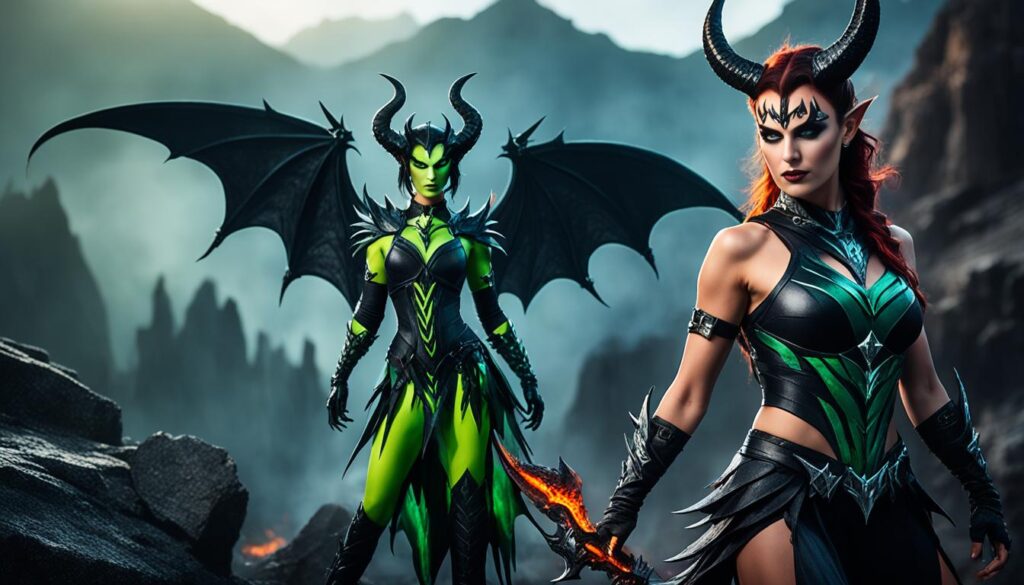
Today, there’s a growing interest in demonic female names. These names stand out. They challenge old naming ways and cheer on being unique. People find these names captivating not just for their uniqueness, but for their rich stories and the tough spirit they show.
Breaking the Stereotype: Power in Baby Girl Names
Parents picking powerful female demon names are making a strong choice. They give their kids a touch of strength and a rich past. This choice can empower their daughters to face the world with boldness and freedom.
- Athena – Greek goddess of wisdom and war, symbolizing intelligence and strategy.
- Minerva – Roman counterpart to Athena, representing wisdom and arts.
- Valkyrie – From Norse mythology, warrior maidens who choose those who may die or live in battle.
- Samara – From the protagonist in “The Ring,” symbolizing resilience and mystery.
- Maeve – An Irish queen known for her intelligence and determination.
- Ishtar – Mesopotamian goddess of fertility, love, war, and sex.
- Boudicca – A queen of the British Celtic Iceni tribe who led an uprising against the Roman Empire.
- Artemisia – Named after a queen and naval strategist from ancient Greek history.
- Zenobia – A 3rd-century queen of the Palmyrene Empire who challenged the Roman Empire.
- Sigourney – Inspired by Sigourney Weaver, who played strong roles like Ellen Ripley in “Alien.”
- Oya – African goddess of wind, lightning, and transformation, a powerful warrior deity.
- Indira – Means “beauty” in Sanskrit, also associated with Indira Gandhi, the former prime minister of India.
- Cleo – Short for Cleopatra, a figure synonymous with power and political acumen.
- Freya – Norse goddess associated with love, beauty, and fierce battle skills.
- Joan – After Joan of Arc, symbolizing courage and leadership.
- Matilda – Means “battle-mighty,” reflecting strength and valor.
- Harriet – After Harriet Tubman, known for her role in the Underground Railroad and fight for freedom.
- Bellatrix – Means “female warrior” in Latin, also known from Harry Potter as a formidable witch.
- Hypatia – An ancient Alexandrian philosopher, representing learning and intellectual power.
- Rhiannon – A Welsh goddess associated with horses and enchanting music, symbolizing witchery and mystery.
- Sekhmet – Egyptian goddess of war and healing, depicted as a lioness, symbolizing might and protection.
- Morrigan – A Celtic goddess of war, fate, and death who was believed to influence battle outcomes.
- Tempest – Signifying turbulent, stormy weather, metaphorically representing a strong and uncontrollable force.
- Calypso – A sea nymph in Greek mythology who held Odysseus on her island, symbolizing allure and detainment.
- Elektra – In Greek mythology, she was determined and played a crucial role in the family revenge saga.
- Sorcha – Means “brightness” in Gaelic, often associated with brightness in character and spirit.
- Theia – Titaness in Greek mythology, mother of the sun, the moon, and the dawn.
- Juno – Roman goddess who protected the state and watched over women, embodying aspects of tradition and power.
- Cassandra – Known for her prophecy in Greek mythology, symbolizing foresight despite tragic destiny.
- Brunhilda – A powerful queen from Germanic legend and the Nibelungenlied, known for her strength and decisive nature.
Dark Goddess Names: Celebrating Feminine Strength
Dark goddess names shake up old views of femininity. They symbolize goddesses who are both nurturing and fiercely protective. Using these names celebrates all aspects of feminine power, changing how we see strength.
- Lilith – Jewish mythology, a figure symbolizing independence and power.
- Morrigan – Celtic goddess of war and fate, known for her ability to foretell doom and victory.
- Hecate – Greek goddess of magic, witchcraft, and crossroads, embodying wisdom and guardianship.
- Kali – Hindu goddess of destruction and rebirth, symbolizing the cleansing of evil.
- Persephone – Greek queen of the underworld, representing the cycle of life and death.
- Nyx – Greek personification of the night, embodying mystery and shadow.
- Tiamat – Babylonian goddess of the ocean and chaos, a symbol of creation and destruction.
- Hel – Norse goddess of the underworld, overseeing those who die of illness or old age.
- Sekhmet – Egyptian warrior goddess and goddess of healing, known for her fierce wrath.
- Skadi – Norse giantess and goddess of winter and hunting, representing strength and endurance.
- Ereshkigal – Sumerian goddess of the underworld, ruling over the dead.
- Cailleach – Celtic hag goddess who controls the weather and the force of winter.
- Durga – Hindu warrior goddess who combats evils and demonic forces, protecting the universe.
- Santa Muerte – Folk saint in Mexican and Mexican-American cultures, associated with healing, protection, and safe delivery to the afterlife.
- Badb – One of the Celtic Morrigan’s aspects, associated with war and prophecy.
- Anat – Semitic goddess of war and strife, known for her ferocity in battle.
- Maman Brigitte – Voodoo loa, protector of graves in cemeteries and symbol of the afterlife.
- Ran – Norse sea goddess who captures sailors with her net, associated with storms.
- Chernobog – Slavic goddess of misfortune and darkness, balancing forces in the universe.
- Ixchel – Maya goddess of childbirth and war, often depicted with attributes of the aged moon goddess.
- Pele – Hawaiian goddess of volcanoes and fire, creator of the Hawaiian Islands.
- The Morrigan – A figure from Irish mythology encompassing battle, strife, and sovereignty.
- Banshee – Irish spirit known as a harbinger of death with her mournful wails.
- Alecto – One of the Furies in Greek mythology, goddess of anger.
- Ala – Igbo goddess of fertility, morality, and the underworld.
- Lovatar – Finnish goddess who is the source of disease, death, and all evils.
- Macha – Another aspect of the Morrigan, associated specifically with war and death.
- Nemain – Irish goddess of the frenzied havoc of war, another aspect of the Morrigan.
- Oya – Yoruba goddess of winds, lightning, and transformation, often associated with cemeteries.
- Mania – Roman goddess of the dead and the underworld, embodying the deeper, darker aspects of human psyche.
From Sorceress to Demoness: Names Packed with History and Lore
The leap from sorceress to demoness shows how female roles have evolved in stories and myths. Picking names rooted in these tales celebrates wisdom, courage, and overcoming challenges. It keeps the incredible stories behind these names alive.
- Circe – Greek enchantress known for her knowledge of potions and spells.
- Lilith – Associated with the night and seen as a figure of power and independence.
- Hecate – Greek goddess of magic, witchcraft, and crossroads.
- Morgan – From Morgan le Fay, the sorceress of Arthurian legend known for her complex role.
- Medea – A sorceress in Greek mythology renowned for her formidable powers and tragic story.
- Baba Yaga – A fearsome witch from Slavic folklore, known for her wisdom and power.
- Jezebel – A biblical queen known for her assertive defiance and alleged sorcery.
- Isis – An Egyptian goddess famed for her magical prowess and deep knowledge.
- Freya – Norse goddess associated with love, beauty, and sorcery.
- Calypso – A nymph in Greek mythology who charmed Odysseus with her song.
- Melusine – A figure from European folklore, a water spirit with a serpentine tail.
- Morrigan – A Celtic goddess associated with war, fate, and sovereignty.
- Aradia – Considered the queen of witches in Italian folklore.
- Nimue – Also known as the Lady of the Lake in Arthurian legend, a powerful enchantress.
- Sycorax – A powerful witch in Shakespeare’s “The Tempest.”
- Ereshkigal – The Sumerian goddess of the underworld, ruling over the dead.
- Kikimora – A house spirit in Slavic mythology, known for causing nightmares.
- Agrat Bat Mahlat – A demoness in Jewish mythology, one of the mates of Samael.
- Hel – The Norse goddess of the underworld, overseeing those who died from illness and old age.
- Lamia – A child-eating demoness from Greek mythology, originally a beautiful queen.
- Pandora – Known for her box that released all evils into the world, a complex figure of curiosity and consequence.
- Tiamat – A Babylonian goddess who embodies the chaos of primordial creation.
- Sedna – The Inuit goddess of the sea and marine animals, a powerful and vengeful spirit.
- Rhiannon – A Welsh goddess associated with horses and enchanting music.
- Levana – From Roman mythology, the goddess associated with the rites of childbirth.
- Cailleach – A divine hag in Scottish and Irish mythology, a creator deity and weather goddess.
- Selene – Greek goddess of the moon, imbued with mystical and enchanting powers.
- Skuld – One of the Norns in Norse mythology, associated with the future.
- Mami Wata – A water spirit venerated in parts of Africa and the diaspora, associated with healing and fertility.
- Lorelei – A Germanic nymph or siren whose singing lures sailors to their doom
Supernatural baby girl names are more than just names; they carry a legacy of freedom from different cultures. They offer a rich heritage for anyone who carries them.
Infusing Character: Devilish Baby Girl Names and Their Stories
The world of devilish baby girl names is large and filled with variety. It brings to mind legends old and new. These names carry with them a touch of the sublime, the powerful, and the mysterious. They tell stories of cleverness, bravery, and magic, making female demon names baby choices unique. They offer not just names, but a legacy of fascinating stories.
Choosing a supernatural baby girl name is like picking a special symbol. It reflects a deep story as colorful as the myths it comes from. It’s more about the story and the legacy than just the sound or fit of the name.
- Ravenna – From “Snow White and the Huntsman,” associated with dark beauty and formidable power.
- Lilith – Jewish folklore’s figure of independence and night, embodying rebellion and freedom.
- Morgan – Derived from Morgan le Fay, the enchantress of Arthurian legend, known for her complexity and power.
- Delilah – Biblical name symbolizing temptation and cunning, with an enduring impact on cultural narratives.
- Jezebel – A name that evokes notions of defiance and unruliness from biblical stories.
- Mara – Hebrew for “bitter,” a name that carries connotations of sorrow yet resilience.
- Seraphina – Rooted in the word “seraphim,” denoting an angelic being of fire and light.
- Desdemona – From Shakespeare’s “Othello,” symbolizing innocence wronged by tragic fate.
- Carmilla – From Gothic literature, a name synonymous with mystery and vampiric allure.
- Bellatrix – Latin for “female warrior,” known from Harry Potter as a fiercely loyal and formidable witch.
- Circe – Greek sorceress who used her magic to transform her enemies, symbolizing enchantment and transformation.
- Nimue – Also known as the Lady of the Lake in Arthurian legends, who wields mysterious power.
- Isolde – A name from Arthurian romance, synonymous with tragic love and enduring passion.
- Drusilla – Ancient Roman, carried into pop culture as a name with vampiric and antique charm.
- Hecate – Greek goddess of witchcraft and magic, often associated with the crossroads and ghostly realms.
- Ursula – Latin for “little bear,” brought to life as a sea witch in “The Little Mermaid.”
- Pandora – Whose box, once opened, released all the evils of humanity, yet also held hope.
- Electra – Greek mythology, a name filled with energy and the drive for revenge.
- Kali – Hindu goddess whose very name is associated with time, change, power, and destruction.
- Medusa – A once-beautiful maiden turned monster, whose gaze could turn people to stone.
- Sabrina – From Latin origin, popularized as a teenage witch, symbolizing youthful magic and charm.
- Tanith – Phoenician lunar goddess, associated with fertility and the heavenly bodies.
- Asmodea – A feminine form of Asmodeus, a king of demons, suggesting a darkly majestic presence.
- Lamia – Greek mythology, a woman transformed into a child-eating monster, symbolizing tragedy and transformation.
- Rowena – Celtic in origin, often associated with wise and magical women in folklore.
- Melisande – From medieval romance, a name that suggests both mystery and beauty.
- Sirena – Derived from the sirens of Greek mythology, encapsulating allure and danger.
- Tatiana – Slavic origin, brought into folklore and literature as a queen of the fairies.
- Vespera – Derived from “vesper,” meaning evening star, suggesting beauty and the transition from day to night.
- Zephyra – A gentle breeze, invoking a subtle yet undeniable force of nature.
Imagine a name like Ravenna, bringing to mind the powerful queen from the “Ramayana.” Or Lilith, echoing through Jewish folklore as a tale of rebellion and freedom. These names are more than just words; they are stories ready to be shared. Originating from early civilizations, they carry the essence of ancient times into today.
Choosing such a name means joining a rich narrative tradition. It’s more than giving a name; it’s offering a role in an ongoing, mythical drama. By selecting a devilish baby girl name, you’re not just naming a child. You’re giving them a crown of age-old tales, reimagined by every new generation.
The Beauty in Darkness: Evil Queen Names for Girls
History shows us names once tied to mythical empires are now popular for baby girls. Evil queen names for girls bring a mix of strong will and captivating charm. They are perfect for parents wanting a name that’s powerful and mysterious.
Inspiration from Legendary Queens of Darkness
Lore gives us names like the Celtic Morrigan, linked to war and death, and Eris, the Greek goddess of strife. These dark and fierce baby girl names inspire with their allure of mystique and dominance.
Evil Queen Names Recast for Today’s Baby Girls
Dark goddess names and the tales of infamous queens are making a comeback. Names like Jadis, the White Witch, and Selene, with her lunar magic, blend ancient mystery with modern charm and sway.
Sovereignty and Power: Choosing a Name Fit for a Queen
Choosing an evil queen name for girls gifts her with unwavering power and independence. Mythological figures like the cunning Medea and the terrifying Gorgon sisters embody royal strength and feminine resilience. They inspire a future of greatness and confidence.
Enchantment in Names: Dark Goddesses and Their Legacy
The night’s allure and ancient legends come alive in dark goddess names. They tempt those who love deep, mysterious tales to enter a world of power and secrecy. These aren’t just names; they’re whispers from long ago, carrying the power of the feminine divine. Let’s explore the shadows to uncover these mysterious beings’ legacies.
Dark goddess names offer inspiration for those wanting a name with ancient strength and mystery. Consider the mighty Chernobog or the transformative Kali. Their stories add depth, making a baby girl’s name more meaningful.
Exploring Dark Goddess Names
Searching female demon names baby reveals timeless treasures. From commanding demonesses to moon goddesses, each name is a gateway to stories and history, promising a life enriched with connections to the past.
Dark Femininity: The Untold Stories of Goddess Names
- Ereshkigal – Sumerian goddess of the underworld, ruling over the dead with great wisdom and power.
- Hecate – Greek goddess associated with magic, crossroads, and ghosts, embodying protection and transformation.
- Nephthys – Egyptian goddess of death, mourning, and service, often depicted as a protective guardian.
- Freya – Norse goddess associated with love, beauty, fertility, war, and death, symbolizing the complexity of life.
- Cailleach – Celtic deity depicted as a weather goddess and harbinger of winter, representing the force of transformation.
- Skadi – Norse giantess and goddess of winter and mountains, a figure of survival and strength.
- Hel – Norse goddess of the underworld, representing death and the finality of life.
- Kali – Hindu goddess of time, creation, destruction, and power, often misunderstood but deeply revered.
- Ixchel – Maya goddess of the moon, water, weaving, and childbirth, symbolizing healing and creativity.
- Baba Yaga – A figure from Slavic folklore, often depicted as a witch-like character with deep knowledge and power.
- Sedna – Inuit goddess of the sea and marine animals, embodying the merciless nature of the sea.
- Anat – Ancient Semitic goddess of war and fertility, showing the duality of creation and destruction.
- Tlazolteotl – Aztec goddess of filth, vice, and purification, symbolizing the cleansing of impurities.
- Laverna – Roman goddess associated with thieves and the underworld, embodying cunning and darkness.
- Sekhmet – Egyptian warrior goddess and goddess of healing, her ferocious aspect as the lioness represents the dual nature of healing and destruction.
- Santa Muerte – A folk saint in Mexican and Mexican-American cultures, associated with healing, protection, and safe delivery to the afterlife.
- Alecto – One of the Furies in Greek mythology, a spirit of vengeance and unceasing anger.
- Pele – Hawaiian goddess of volcanoes and fire, who shapes the land through her fiery temper and destructive power.
- Macha – One of the aspects of the Morrigan in Celtic mythology, associated with war, death, and sovereignty.
- Lilith – A figure from Jewish mythology often depicted as a night demon but symbolizing independence and control over one’s own destiny.
Names like these show a side of femininity that’s strong, transformative, and deeply tied to nature and existence. They remind us of the hidden strength within.
Embrace the Enchantment: Baby Names That Echo the Past
Choosing a name like Elvira or Ereshkigal connects a child to ancient civilizations. These supernatural baby girl names bring the weight of history and mystery, inspiring strength and awe.
Names of evil queen names for girls or powerful female demon names offer rich, enchanting choices. These names encourage a new generation to embrace the power and stories of the past.
Creative Edginess: Evil Girl Names with Aesthetic Appeal
When naming babies, some parents seek out the unique. This has led to loving evil girl names known for their artistic touch. These names hold stories and mystery, showing a love for the dark and unique.
Dark and fierce baby girl names carry the echoes of myths and legends. They offer not just a name, but a piece of history. Their strong vibe sets them apart, making the person who carries the name stand out boldly.
- Devilish baby girl names carry tales filled with intrigue. They hold stories and legacies yet to be discovered.
- Such names spell out courage. They call to the brave, to those ready for adventure.
- The beauty in these names lies not just in looks. The real depth is in the meaning each carries.
This blend of old and new makes evil girl names perfect for those making new paths. They honor the past while creating a new future.
- Morgana – Associated with Arthurian legend, this name conjures images of enchantment and complex sorcery.
- Ravenna – From the character in “Snow White and the Huntsman,” symbolizing dark beauty and formidable power.
- Belladonna – Italian for “beautiful lady” but known as a poisonous plant, this name suggests deadly beauty.
- Drusilla – A name with ancient Roman roots, brought into the modern gothic imagination with a vampiric twist.
- Carmilla – From a Gothic novella, predating Dracula, associated with early vampire myths.
- Lamia – Greek mythology presents her as a queen turned into a child-eating demon, representing tragedy and transformation.
- Desdemona – Meaning “ill-fated one” from Shakespeare’s “Othello,” symbolizing a dramatic and poignant story.
- Maleficent – Meaning “to do evil,” popularized by Disney, evoking power and transformation from villain to antihero.
- Elvira – Associated with the Mistress of the Dark, this name brings a campy yet darkly glamorous vibe.
- Nimue – Known as the Lady of the Lake in Arthurian legends, a mysterious and powerful sorceress.
- Isolde – A name from Arthurian romance, filled with love and tragedy.
- Pandora – “All gifted” in Greek, known for unleashing both evil and hope into the world.
- Lucretia – A historical and literary name associated with virtue and tragic dignity.
- Hecate – Greek goddess of witchcraft and magic, often depicted as a protector of the city and the home.
- Medea – A sorceress in Greek mythology known for her revenge against betrayal, embodying both genius and fury.
- Sylvanas – Evoking the forest and its mysterious allure, also known from video game lore as a powerful and tragic heroine.
- Ophelia – From Shakespeare’s “Hamlet,” symbolizing beauty driven to madness and tragedy.
- Ursula – Latin for “little bear,” but often associated with the sea witch from “The Little Mermaid.”
- Circe – A sorceress in Greek mythology who turned men into animals, synonymous with enchanting power.
- Electra – Meaning “shining bright,” from Greek mythology, associated with passion and vengeance.
- Morrigan – Celtic goddess of war, fate, and death, imbued with magic and mystery.
- Lenore – Popularized by Edgar Allan Poe’s poetry, associated with loss and the haunted beauty of love.
- Jezebel – Biblical queen known for her assertive defiance and tragic end, symbolizing unrestrained ambition.
- Ligeia – Another Poe character, representing haunting beauty and eerie intelligence.
- Seraphina – Derived from “seraphim,” suggesting fiery, angelic qualities.
- Calypso – A nymph in Greek mythology who captivated Odysseus, synonymous with seduction and detainment.
- Mab – Queen of the fairies in English folklore, often portrayed as mischievous and powerful.
- Regan – One of the daughters in Shakespeare’s “King Lear,” associated with ruthlessness and ambition.
- Tamsin – A diminutive of Thomasina, carrying a witchy, Cornish charm.
- Vespera – Derived from “vesper,” meaning evening star, evoking the beauty and mystery of the night.
These names do more than identify. Dark and fierce baby girl names symbolize power, resilience, and control. Naming becomes an art, celebrating personal style and the strong spirits in folklore.
Dark Poetry: Selections of Fierce Baby Girl Names
Parents looking for a unique name often choose fierce baby girl names. These aren’t just any names. They wrap the child in dark beauty and mystery. They’re inspired by old tales and mythologies.
The Aesthetic of Darkness: Name Choices for Creative Parents
Ancient stories whisper through names from dark goddess names to powerful female demon names. For those wanting something truly different, names like Keres or Leviathan stand out. Such fierce baby girl names give a child uniqueness and a rich cultural connection. They also add a touch of poetry.
Exploring Names That Echo the Mystique of the Night
Nyx is a name that captures the night’s mystery. The Slavic Nocturne reaches into twilight’s secrets. For those drawn to supernatural baby girl names, these offer endless tales and myths. They’re perfect for daughters to carry these stories into the future.
Fierce and Formidable: Female Names with Poetic Darkness
In the world of dark and fierce baby girl names, you meet Greek Gorgons and Norse Hel. These names echo power and fight. They bring to mind warrior women and gods. Demonic female names show strength and grace from their legendary tales.
- Names like evil queen names for girls speak of power and ancient stories.
- Hel shows the dark majesty of underworld royalty. These names shape history’s narrative.
- Eris stirs thoughts of strife and strong personalities. It claims stories filled with tension and resolve.
These names inspire girls to uncover their strength and mystery. They lead stories of courage and endurance, all wrapped in the allure of darkness.
- Alecto – One of the Furies in Greek mythology, known for her role in vengeance and unceasing anger.
- Andromache – A figure of Greek mythology, wife of Hector, known for her strength amidst tragedy.
- Brunhilda – A valkyrie and queen in Germanic legend, associated with battle and strategic depth.
- Cassiopeia – The vain queen in Greek mythology who boasted about her unrivaled beauty, turned into a constellation.
- Dione – An ancient Greek goddess, often associated with the oracle at Dodona and motherly figures in myth.
- Eris – Greek goddess of strife and discord, often invoked in tales of chaos and challenge.
- Hecuba – Queen of Troy in Greek mythology, known for her tragic destiny and strong maternal instincts.
- Igraine – The mother of King Arthur in Arthurian legend, a symbol of mystery and magic.
- Jocasta – Mother and wife in the Greek myth of Oedipus, representing complex destinies.
- Klytaimnestra – A queen of Greek mythology who avenged the sacrifice of her daughter.
- Medusa – A Gorgon in Greek mythology, whose gaze could turn people to stone, symbolizing protection and invincibility.
- Nemesis – The Greek goddess of vengeance, balancing the scales of human fortune and justice.
- Penthesilea – A queen of the Amazons in Greek mythology, known for her bravery and tragic encounter with Achilles.
- Quintessa – A name that suggests a mysterious and powerful essence, suitable for a sorceress or a queen.
- Rhiannon – A goddess from Welsh mythology, associated with enchanting birds and horses, embodying magic and fertility.
- Scylla – Once a beautiful nymph, transformed into a monstrous sea creature in Greek mythology, representing transformation and challenge.
- Tisiphone – Another of the Furies, focused on punishment of murderers, symbolizing relentless justice.
- Umay – A goddess from Turkic mythology, associated with the protection of women and children.
- Valkyrie – From Norse mythology, the choosers of the slain in battle, representing death and destiny.
- Zenobia – A 3rd-century queen of the Palmyrene Empire, known for her intelligence, cultural patronage, and military acumen.
The Art of Naming: Dark and Mysterious Baby Girl Names
Choosing a name is a blend of creativity and tradition. It’s a time when history and heritage come together. This creates a lasting legacy. When selecting dark and mysterious baby girl names, you touch on ancient tales. These aren’t just names. They carry stories from a time when myths touched daily lives.
Names with roots in lore, like demonic female names ‘Hecate’ or ‘Circe’, evoke awe. They suggest power and connect the bearer to old, enigmatic tales. This breathes life into historical legends.
For lovers of the supernatural, names like ‘Morgana’ and ‘Selene’ are perfect. Supernatural baby girl names draw from the stars and unseen worlds. They bring a unique charm and an inner strength.
- Arachne – A woman in Greek mythology turned into a spider by Athena, symbolizing skill and transformation.
- Bellona – Roman goddess of war, her name conveys battle and strength.
- Calypso – A nymph in Greek mythology who captivated Odysseus with her charm and song.
- Despoina – In Greek mythology, a title for a goddess of mystery connected with the Eleusinian mysteries.
- Echo – A nymph cursed to only repeat the words of others, symbolizing unrequited love and loss.
- Freyja – A Norse goddess associated with love, beauty, and fertility as well as war and death.
- Gráinne – In Irish legend, a figure of passion and pursuit, symbolizing desire and defiance.
- Helle – From Greek mythology, a figure whose name is tied to the Hellespont, a stretch of water with a story of escape and tragedy.
- Ishtar – Ancient Mesopotamian goddess of love and war, embodying the duality of nurturing and destruction.
- Jezabel – A variant of Jezebel, evoking a sense of ill-fated queenliness and misunderstood autonomy.
- Keira – Derived from Ciara, a name with Gaelic roots meaning “dark,” and suggesting hidden depths.
- Ligeia – From Greek mythology, known for her beautiful voice, represents the alluring nature of the unknown.
- Mab – Queen Mab, a fairy figure in English folklore, known for her influence over dreams.
- Ondine – A water nymph who gains a soul through marriage but is doomed if betrayed, representing transformation and vulnerability.
- Phaedra – In Greek mythology, her name is synonymous with tragic decisions and forbidden love.
- Quintessa – Suggests a quintessential essence, with a hint of alchemical and mystical undertones.
- Rusalka – In Slavic mythology, a water nymph similar to a siren, connected with themes of allure and melancholy.
- Sorsha – A warrior woman from the film “Willow,” representing bravery and change.
- Thalassa – The primordial spirit of the sea in Greek mythology, representing the deep and unfathomable.
- Undine – From folklore, water spirits that must marry to gain a soul, symbolizing transformation and longing.
- Vesper – Signifying the evening star, bringing with it themes of darkness and light.
- Willa – An old German name meaning “will,” “resolution,” or “protection,” carrying connotations of strength and determination.
- Xanthe – Meaning “golden” or “yellow,” from Greek mythology, symbolizing brilliance and attractiveness.
- Ysolde – Another form of Isolde, full of romance and tragic love.
- Zephyra – A gentle breeze, the female counterpart of Zephyrus, Greek god of the west wind, symbolizing subtle influence and change.
- Acantha – Greek for “thorn,” a nymph who resisted Apollo, representing resilience and beauty amidst adversity.
- Beatrix – Derived from Viatrix, Latin for “voyager” (traveler), and associated with blessedness and happiness in spite of trials.
- Cirilla – Feminine form of Cirillus, meaning “lordly,” popularized by the fantasy series The Witcher as a name of power and prophecy.
- Dahlia – Named after the flower, which carries dark connotations in the Victorian language of flowers, symbolizing dignity and elegance amid mystery.
These names weave darkness into their very fibers. They remind us of when the spiritual and earthly were one. They dare us to explore stories and destinies. To remember when names were both feared and cherished.
Picking one of these names does more than honor the past. It embraces a rich story full of depth and intrigue. A well-chosen name from these depths celebrates a legacy. It also opens the door for new tales to emerge.
Conclusion
Choosing female demon names for babies connects them to a deep history, power, and mystery. These names come from the hidden parts of mythology. They give a strong sense of identity and link children to ancient stories. Dark goddess names highlight the lasting impact of these powerful figures. They reflect the rich stories and strong spirits of the past.
Parents picking these unique names give their kids a touch of mystery and power. These names are far from common. They show a strong connection to culture and history. Each name is full of the strength and honor of legendary figures.
These names are not just different; they are meaningful. They show a love for deep stories and the beauty in darkness. Female demon, goddess, and supernatural names are special. They honor ancient wisdom, personal courage, and the beauty in dark stories. This list of names offers inspiration and connection to a rich cultural past.
